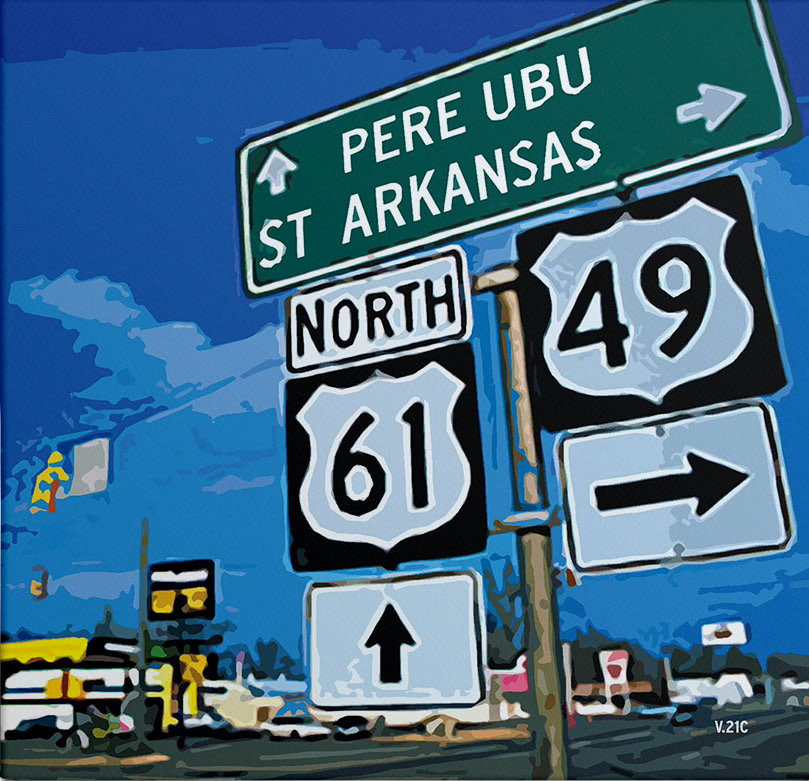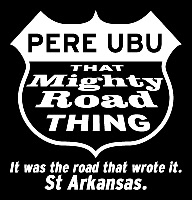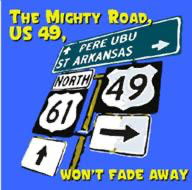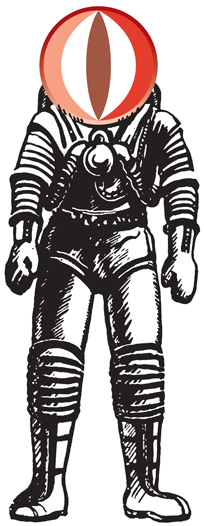

- Saint Arkansas
- The Fevered Dream of Hernando DeSoto
- Slow Walking Daddy
- Michele
- 333
- Hell
- Phone Home Jonah
- Lisbon
- Mr Steve
- Where's The Truth
- Dark

Pere Ubu
Saint Arkansas
Released May 20 2002.
Produced by David Thomas
Fire Records FIRECD372, cd, coming Sep 2021
Fire Records FIRELP372, dark blue vinyl, coming Sep 2021
Remix by David Thomas, master by Brian Pyle.
Produced by David Thomas
Fire Records FIRECD372, cd, coming Sep 2021
Fire Records FIRELP372, dark blue vinyl, coming Sep 2021
Remix by David Thomas, master by Brian Pyle.
Release Notes
In the lower right hand corner of the front cover of the 2021 remix is a notation reading 'V.2C.'Saint Arkansas is the 12th studio release from Pere Ubu and the 18th album produced by the group's 27 year history. Its predecessor, Pennsylvania (1998), received rave reviews. America's preeminent critic, Greil Marcus, rated it #1 in the Village Voice Pazz & Jop Music Critics Poll for 1998 and devoted a chapter of his latest book of essays to it (Double Trouble, 2000, pages 163-69).
The writing of the music was financed, unwittingly, by the Rock n Roll Hall of Fame, and the words written by the Mighty Road from Conway Arkansas to Tupelo Mississippi, I-40 to US 49 to State 6.
I drove the route and wrote down what the Road was telling me.
Production Notes
Produced by David Thomas.
Engineered by Paul Hamann at Suma, Painesville OH.
Artwork by John Thompson.
Remixed by David Thomas in 2021.
Remastered by Brian Pyle in 2021.
Design updated in 2021 by Niall McCormack.
All songs written by Herman - Mehlman - Temple - Thomas - Wheeler ©2002 Fire Songs, under exclusive licence from Ubu Projex.
Engineered by Paul Hamann at Suma, Painesville OH.
Artwork by John Thompson.
Remixed by David Thomas in 2021.
Remastered by Brian Pyle in 2021.
Design updated in 2021 by Niall McCormack.
All songs written by Herman - Mehlman - Temple - Thomas - Wheeler ©2002 Fire Songs, under exclusive licence from Ubu Projex.
Pere Ubu (v.11)
- David Thomas
- vocals
- Tom Herman
- guitar, organ, backing vocals
- Robert Wheeler
- EML synthesizer, theremin, piano
- Michele Temple
- bass, piano, organ
- Steve Mehlman
- drums, organ
- Guest Musician
- Jim Jones
- organ, guitar
Release History
- spinART Records SPART 108 (US) Jun 18 2002 cd.
- Bomba Records BOM 22160 (Japan) May 26 2002 cd.
- Glitterhouse Records GRCD 554(UK/EU) May 20 2002 cd.
- Cooking Vinyl US Records COOKCD904 (US) 2006 cd.
- Fire Records FIRELP469, Drive, He Said vinyl box set May 26 2017
Press Reaction
Mojo, May 2002"Excellent 12th studio album from pioneer punks, out-rockers, avant gardistes... whatever you want to call 'em... The 1975 recordings of David Thomas's groundbreaking proto-Ubu band, Rocket From The Tombs, recently surfaced on CD. Putting together that package seems to have prompted Thomas to rethink his main project. Where 1998's superb Pennsylvania evinced a cinemascopic breadth, St Arkansas is more immediate, energised and claustrophobic; and redolent of late-night TV and transistor radio rather than the wide-screen. Steve Mehlman's stark, rehearsal-room drums and Robert Wheeler's squirming analog synths set the sonic scene for Thomas's existential, Mobius strip travelogues. 333 displays the urgent, questing thrust of late '70s Ubu prime time; it is followed, uncoincidentally, by Hell - a track spattered with disjointed, bluesy piano and limping percussion; while Phone Home Jonah journeys even further back - sounding like a bunch of mid-60s Pittsburgh garage punkers who've read too much Kafka. It's difficult to think of a more important band currently working."
Q, 6/02, p.120
In a cultural climate where anger wears big shorts, all hail the suited Kings Of Being Archly Annoyed.
Mojo, 6/02, p.122
Immediate, energised and claustrophobic; redolent of late-night TV and transistor radio rather than the widescreen....It's difficult to think of a more important band currently working.
The Sunday Times
Straddling the extremes of pure, uncompromising modern art and pure, uncompromising loud rock in the determined effort to meld them into a cohesive whole.
The Wire, 7/02, p.60
The most focused, succinct and downright enjoyable Pere Ubu album to emerge since their reformation in the late 1980s.
READ MORE
More reviews
All Music Guide, Robert L. DoerschukNo band has sustained as much alt-credibility as long as Pere Ubu. While St. Arkansas doesn't divert from the paths the bandmembers have already traveled, it's worth remembering that these guys started this trip 27 years prior to this album, and noting as well that their lyrical and musical creativity is undiminished by time. Recorded dry, with a boxlike ambience, David Thomas's vocals gnarl like a weed, repulsive yet irresistible, in a garden of broken glass. While the band scatters shards of pointed sound around him, Thomas tells cryptic, twisted tales; on "Slow Walking Daddy" his strangled bleat transplants a Willy Loman character into shadows of vague but looming doom. For the song "Hell" he switches to a smoky mumble and reflects, with odd detachment, on finding himself in perdition -- a place depicted musically by a muffled, lurching drum motif, some keyboard wheezes, and a distant out of tune piano. The closing track, "Dark," wraps up the theme of the album -- tragic self-delusion in a world filled with indifference; Thomas' delivery of the key line, a hopeless mantra to "AM radio," is a masterful bit of expression. On each track he presents himself as more of an actor or a performance artist than a singer, an assumption of identity that would challenge almost any band's approach to accompaniment. In this sense, as well as in his poetic integrity and superb connection to his musicians, and in the dark majesty of his declamation, Thomas casts a dangerous spell with St. Arkansas and reaffirms his stature as a peer of Tom Waits.
Uncut, Andy Gill, July 2002
The 18th album of their 27-year career St Arkansas is one of Pere Ubu's strongest ever albums, and is fulsome testament to both the enduring power and peculiarity of the band's avant-rock stylings, and to the driving force of its vocalist/director David Thomas. 'Driving' is the operative word here, too, St Arkansas extending the singer's long-running quest to document American life and space in the manner most appropriate to the culture-- ie, from inside a car. He's already written more car songs than Chuck Berry, The Beach Boys and Bruce Springsteen combined, but you may not have recognized them as such, so obliquely do they proceed: it's not the car itself that absorbs his interest so much as the passing parade glimpsed through its windscreen. Indeed, where others might hymn their Rocket 88 or Pink Cadillac, Thomas is more inclined to admire the road itself. "I love that highway, US 322," he sings on "Slow Walking Daddy", one of the standout tracks here... in which the sharp whine of his vocal basked in a subdued arrangement that's sunshine-sinister, like a David Lynch small-town scene. Elsewhere, "333" is a small, scurrying rocker with Thomas proclaiming "my home is on the moon" in a sing-song mutter, "Hell" an exercise in aimless desolation picked out in desultory organ, stumbling tack piano and tip-tap cymbals, with Thomas crooning like an enervated Elvis, and "Phone Home Jonah" an angular, atonal rocker whose sheer momentum belies Thomas' claim to have "lost my will by the side of the road". The band's trademark quizzical cacophony of wiry guitar, angry-bee synth and galumphing Beefheartian drums is as spikily propulsive as ever on tracks like "Lisbon" and "The Fevered Dream of Hernando DeSoto", while "Steve" and "Michele" contain some of Thomas' most arresting images, such as the revelation: "I am an eraser / The sheet is nearly white / But something still nags at me / It's a smear of graphite / I will rewrite and re-cast / So nothing can haunt the future / of my fabulous past." The LP concludes with him driving out into the wilderness in the nine-minute "Dark" , in search of a sense of purpose, intoning the haunting, mantra-like refrain, "Oh the radio, AM radio, oh the radio will set you free" over spindly, nagging guitar and blue-bruised organ tones. The irony being, of course, that Ubu are rarely, if ever, heard on the radio, which today seeks to imprison listeners rather than liberate them.
Kerrang!, Catherine Chambers, June 8 2003
Uncompromising is an epithet bandied around with frightening abandonment these days, and one which should really only apply to those who strive to push beyond musical boundaries and bend the parameters of modern music. Bands such as '70s art-punk collective Pere Ubu. Fronted by idiosyncratic vocalist David Thomas, Pere Ubu have been experimenting with avant-garde noise for over three decades-- and as 'St Arkansas,' their 12th studio album indicates, they aren't about to change now. 'St Arkansas' is a cornucopia of fractured rhythms and Beefheartesque quirkiness that explores garage punk, new wave and art-rock. Hidden grooves lurk in the loping, Talking Heads-esque basslines of 'Slow Walking Daddy,' while closer 'Dark' is Pere ubu at their most dramatic. Still relevant after all these years, then.
Classic Rock, Carol Clerk, June 2002
Many of their contemporaries have self-destructed, fallen by the wayside or grown fat and comfortable; Pere Ubu, after 18 albums and a 27-year career, are still, apparently, starving, still driven to commit perverse and savage acts upon the conventional structures of rock. F***ing with the accepted, revelling in the unexpected, David Thomas and his saboteurs journey from the avant garde to the atmospheric, sometimes approaching but never quite reaching the perimeters of 'normality.' The up-tempo 'Phone Home Jonah' and 'Steve,' with its curling, rising guitar riff, venture closest, In contrast, 'Hell' really is a nightmarish invention, the sparse drum thudding like a heartbeat about to stop and Thomas singing like a man on his death bed. The searching 'Dark' is equally gripping, and in the thwarted-love lyrics of 'Where's The Truth,' there is, of course, no happy ending. Peculiar vocal treatments and keyboard splashes, chunks of brass and moments of industrial clamour, cacophony and hypnotic persuasion are among the weapons with which Pere Ubu have secured their right to be here now.
Q, Andy Fyfe, June 2002
Angular Ohio rockers celebrate silver jubilee with 12th and darkest album to date.
After their brief, relative stab at pop in the late '80s, Pere Ubu were bound to return to the industrialised obsessions of their early career. With St Arkansas we really have come full circle, and echoes of their debut EP Datapanik In The Year Zero will bring joy to the chilled hearts of those who take their avant garde with a pinch of esoterica. David Thomas's reedy, mass murderer vocals remain as unlikely as they are compelling while the spiky, sometimes challenging music is seldom without a groove, except on Hell, where it's non-existent, and Lisbon, which appears to be getting crushed by the weight of the world if the world were made entirely of pig iron. In a cultural climate where anger wears big shorts, all hail the suited Kings of Being Archly Annoyed.
Metroland (Albany), J. Eric Smith
Pere Ubu's twelfth studio record is, in short, a creative masterpiece, a nigh-unto-perfect collection of ten well written, brilliantly played and crisply recorded songs, each of them solid enough to invite repeated listens, each of them rich enough to make such return visits rewarding. Many of Ubu's trademark sounds (David Thomas' always-distinctive warbling, nasal vocal style, squiggly EML synthesizer and theremin fills, fluid bass lines mixed to the fore atop metronomic drum cadences) are evident on St. Arkansas, but the sonic palette is expanded, too, in a variety of effective and exciting ways. Organ plays (no pun intended) an important role in this record's fever-dream flavor, and haunting piano melodies or nearly subliminal, finger-picked, minor-key guitar figures are as likely to augment each song's mood as are the expected synthetics. Recorded by Thomas and longtime engineer Paul Hamann at the group's beloved Suma studio in Cleveland, with an ice-dry sonic style that enhances the album's sweat-inducing musical miasma, the overall effect of this record is as organic and positively lived-in sounding as anything by Ubu since 1978's Dub Housing. That latter record has long been regarded by many Ubuphiles and music critics alike as the group's defining work--but to this particular listener's ears (and eyes, mouth, nose and hands), St. Arkansas now defines the new standard of excellence for Pere Ubu.
Entertainment Weekly, 7/26/02, p.68
"A blasted landscape of arid loneliness, interupted by moments of surreal humor... an utterly typical piece of witty Ubu absurdity."
VG (Norway) awards 5 out of 6
Norwegian language review.
The Beat, May 2002
This is their 12th studio album, the first from the current line-up since Pennsylvania four years ago which marked a return to the noise rock sonics of their early years after the more accessible balance of avant garde and pop that had characterised the work since their '87 reunion. This relaxes again somewhat to lace the fractured songs with recognisable tunes through which the classic staples of soul (Hell even makes a direct nod to Mercy Mercy Me) and r&b are easily discernible under the coating of industrial techno. Delivered in Thomas's distinctive throaty warble exercising its vocal gymnastics, to be honest I have no idea what on earth most of his bizarre songs are actually going on about, especially given that many lyrics are aurally indecipherable, but they tend to impact as much on gut response as anything... If you've never encountered them before, don't be scared off by fears that this is difficult listening. Open the ears and you'll find it as old school rootsy as the Blind Boys of Alabama or vintage Elvis.
The Independent, Andy Gill, 5/3/2
Pere Ubu's longevity is one of rock's more encouraging mysteries. That a band as uncompromising as this, making music of such integrity, and with such disregard for the usual music-biz requisites of style, promotion and performance, should have lasted this long is a tribute to the persistence both of the group and their fans. This, the 18th album of their 27-year career, is as quixotic, quirky and bloody-minded as any, with sweeping changes in tone, tempo and mood - often in the same song - negotiated with aplomb, the whole held together by David Thomas's sinister cartoon vocals. As ever, movement figures prominently in his lyrics, with observations snatched from walks and car journeys, while the band's characteristic blend of angular guitar figures, angry-wasp synth noises and churning underbelly beats rolls the songs along with surprising grace and sure-footedness. "Slow Walking Daddy" is one of several standout tracks, Thomas strolling US Highway 322 "through the crazy green of a midsummer nowhere", while the band plays subdued and steady. The weird thing is that despite the spiky avant-rock settings and the apparently gloomy cast of some of the subject-matter, there's a warmth and optimism about St Arkansas that speaks volumes about the band's restless, inquisitive attitude.
The Guardian, Adam Sweeting, 5/3/2
Their 12th studio album finds Pere Ubu riding a fresh wave of critical approbation. The current six-piece line-up is the longest-lived version of the group, and they have evolved an innovative relationship that allows them to take conventional riffs or chord structures and then wreak havoc on them with their internal logic and sense of perspective. The final track, Dark, is a particularly fine specimen of how eerie bass, voice and guitar can be, but is by no means unique. Slow Walking Daddy is more a creeping blues than a walking one, and David Thomas manages to sing the line, "I wear a suit and honey I wear a tie" as if he is standing in a basement full of dismembered corpses, drenched in blood. Not pretty, but it is like having a bucket of ice-cold water chucked over your brain.


